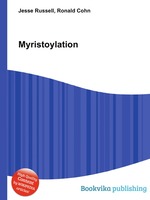Myristoylation
Jesse Russell Ronald Cohn
бумажная книга
High Quality Content by WIKIPEDIA articles! Myristoylation is an irreversible, co-translational (during translation) protein modification found in animals, plants, fungi, protozoans and viruses. In this protein modification, a myristoyl group (derived from myristic acid) is covalently attached via an amide bond to the alpha-amino group of an N-terminal amino acid of a nascent polypeptide. It is more common on glycine residues but also occurs on other amino acids. The modification is catalyzed by the enzyme N-myristoyltransferase (NMT), and occurs most commonly on glycine residues exposed during co-translational N-terminal methionine removal. Myristoylation also occurs post-translationally, for example when previously internal glycine residues become exposed by caspase cleavage during apoptosis.


